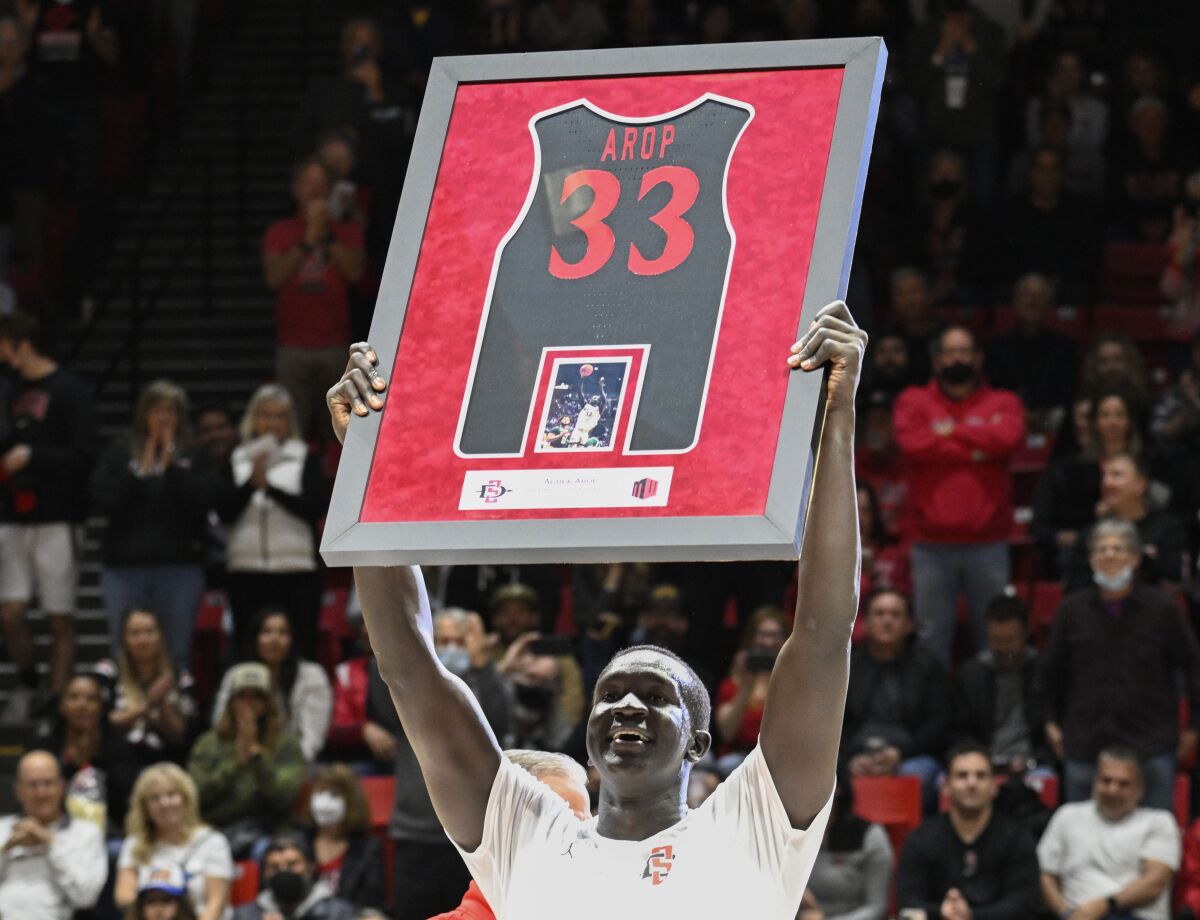Aguek Arop found a place to prop up his mobile phone outside the U.S. Department of Homeland Security on Avenue H in Omaha, Neb. He set the camera timer, then scurried into position next to his mother, his left hand holding an American flag, his right hand displaying a certificate in front of them.
3 … 2 … 1 … smile.
Click.
They both were wearing traditional, colorful South Sudanese clothing, representative of where they came from.
The piece of paper in his right hand and pride etched across their faces signified where they’ve arrived.
It was a certificate of U.S. citizenship, the culmination of a two-decade journey that began in war-ravaged South Sudan in the late 1990s, wound through a destitute refugee camp in Egypt, relocated to Houston after being granted political asylum and then Omaha and now San Diego State, where he is a fifth-year senior forward on the Aztecs basketball team. In May, he became the first person in his family to graduate from college. In July, he became a U.S. citizen.
“A huge deal,” coach Brian Dutcher said. “Even though he’s lived in the U.S. since he was 4 years old, it took a while to get it. We’re so happy for ‘AG’ and his family. Big moments for him this year: his graduation last spring, and now following it up with getting his U.S. citizenship. I am so excited for him.”
Refugees granted political asylum initially qualify for permanent resident status and ultimately can apply for citizenship, which requires mountains of paperwork, interminable patience, an interview, an oral exam and a written test. Minors of refugees typically get citizenship once their parents do, and Arop’s father passed everything except the written portion when Arop was a senior in high school and still 17.
He applied as an adult during his freshman year at SDSU, but he couldn’t afford an immigration attorney and was denied.
“Maybe I messed up somewhere,” Arop said. “They’re very nit-picky. You can mess up one letter and mess up the whole thing. I’m thinking that’s what happened.”
He applied again last summer with the assistance of an attorney provided through a church charity. Because his residency is officially in Nebraska, he had to conduct the interview there. He got two weeks’ notice of an available appointment in late June and immediately booked a flight.
The test consists of 10 questions culled from a possible 100 that cover American civics, history, geography and holidays. You must get six correct.
The House of Representatives has how many voting members? (435)
When was the Constitution written? (1787)
The Federalist Papers supported the passage of the U.S. Constitution. Name one of the writers. (James Madison, Alexander Hamilton, John Jay.)
How many amendments does the Constitution have? (27)
Who is the Chief Justice of the United States? (Hon. John G. Roberts, Jr.)
Name your U.S. Representative.
“Even though I grew up here and went to school here, it wasn’t that easy,” Arop said. “I studied a lot. I practically memorized all of them. I was determined to pass it.”
He did, but now he needed to be sworn in to complete the process. It can take anywhere from a few hours to two weeks to secure that appointment, and Arop was scheduled to fly back to San Diego the next day and continue summer workouts.
“I asked if there’s any way I can get in today, because I don’t have any money to buy another flight to come back,” Arop said. “He says, ‘If you’re patient, I can get you in today.’ Then the computer froze. I was all worried that I was going to have to come back. I said a little prayer. The computer unfreezes and he says, ‘Come back at 1.’ ”
He called his mother, who put on her best green, yellow and red traditional dress and waited outside the U.S. Department of Homeland Security on Avenue H. Arop emerged with his certificate, found a place to prop up his mobile phone and set the camera timer.
Only one of his eight siblings was granted U.S. citizenship because he was born here. Both his parents finalized it over the last couple years, as did two brothers.
One brother wasn’t so fortunate. He got in trouble and was deported in 2018 before he could obtain citizenship and receive the legal protections that come with it.
“I was like, ‘I’m just getting my citizenship,’ ” Arop said of his July trip to Omaha. “But once I was sworn in, it started to sink in. It was a big sigh of relief. I didn’t realize I would feel that way. My brother, he’s still in South Sudan and hasn’t been able to come back. So it was a little emotional.”

SDSU forward Aguek Arop (33) on Senior Night last March at Viejas Arena.
(Denis Poroy)
As a permanent resident but not full-fledged citizen, he couldn’t renew his driver’s license online and had to wait in line at the Department of Motor Vehicles every few years. He also couldn’t get a U.S. passport, essentially confining him to the United States for fear he might not be admitted back in.
His only option for a passport was from South Sudan, which gained independence from Sudan in 2011 and opened an embassy in Washington, D.C., the following year. But that requires traveling to D.C., which one of his cousins from Omaha did, only for the passport machine to break. No passport.
A roommate regularly crossed the border to Tijuana for the food scene and salsa dancing, one of Arop’s favorite activities. “I could never go,” he said.
So Tijuana will be the first destination once he gets a U.S. passport.
South Sudan is next on the list, a chance to see his brother and relatives left behind when they fled the civil war that killed an estimated 400,000 and displaced another 4 million. They’ve spoken on the phone, and he’s tried to maintain a rudimentary handle on the language, knowing most of his family there doesn’t speak English.
The plan is to finish his basketball career at SDSU, then go next summer and visit his rural village. Become immersed in the culture. Sample the cuisine. Wiggle his toes in African dirt.
“It will definitely be a culture shock,” Arop said. “I won’t know until I experience it, but I’m expecting it to be a huge shock, eye opening. You see war-torn countries like South Sudan and what’s going on there, things Americans would never think would happen here. You see people here complaining about the dumbest things and talking about how they hate America: America this, America that.
“I’m a lot more appreciative. My parents and our family, we didn’t have the opportunities that we did here. I’m extremely grateful and thankful. I have much love for America. … I don’t take it for granted.”





















Discussion about this post